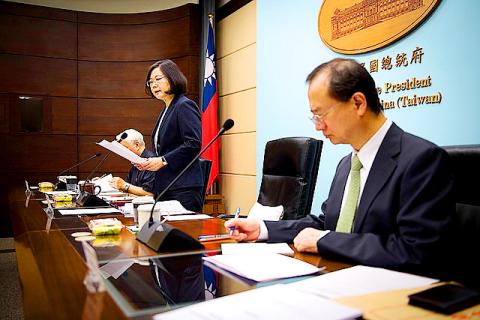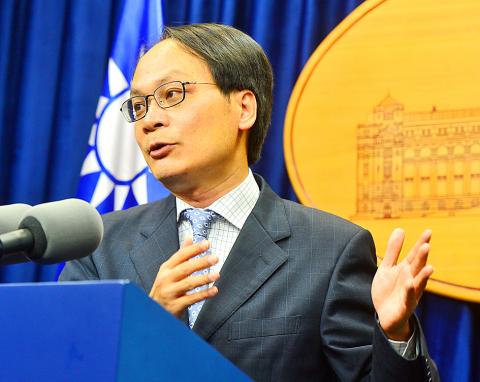President Tsai Ing-wen (蔡英文) yesterday outlined the key areas of focus for judicial reform, including increasing courtroom transparency, improving the selection and discipline of judges and prosecutors, bolstering judicial neutrality and professionalism, and establishing “trials with civic participation.”
Tsai made the comments at the sixth general meeting of the preparatory committee for the National Congress on Judicial Reform held at the Presidential Office, calling the items necessary to meet the public’s expectations.
“The courtroom must become more transparent by various means, including issuing verdicts that are comprehensible to the average person. The process for selecting competent judges and prosecutors and for weeding out incompetent ones must be improved. The professionalism and political neutrality of the judiciary must be bolstered. A system for civic participation in trials must be instituted,” Tsai said.

Photo courtesy of the Presidential Office
She also instructed agencies to make detailed proposals and set a clear timetable for their implementation.
The committee has worked hard over 40 sessions since November last year to create an agenda that comprises the most important items, Tsai said.
As legal reform must be based on popular support, the proposals must be described in comprehensible language, she said.

Photo: Wang Yi-song, Taipei Times
The reforms would be unsuccessful if they are not communicated to the public, regardless of their professional merits, Tsai said.
Civic participation in trials — which is largely supported by the public — is a priority, committee deputy executive secretary Lin Feng-jeng (林?正) told a news conference after the meeting.
The Judicial Yuan is drafting a trial system that is suitable for the nation and would make “citizen judges” a reality as soon as possible, he said.
Courtroom transparency is also to be improved by, for example, writing legal documents and reference books in modern, accessible Chinese, he said.
The training and selection of judges, prosecutors and lawyers would be streamlined by implementing a single bar examination instead of holding separate certification exams for each, Lin said.
Practical knowledge is to be emphasized in the education of judges and prosecutors, he added.
Other focuses include opening prosecutorial appointments and administrations to democratic oversight, making the court structure less top-heavy, establishing specialized courts for cases that require professional knowledge and procedural changes for the Council of Grand Justices, he said.
A stronger oversight system and ridding subpar officers is needed to restore public confidence, and review procedures should be made more effective, he said.
The committee is determined to protect the rights of the disadvantaged and has established several directives to do so, such as improving evidentiary laws, making recourse better available to the wrongfully convicted, creating protections for minors’ privacy and the rights of the disadvantaged, and implementing restorative justice, Lin said.
The committee is scheduled to hold a live-streamed general meeting at the Presidential Office on Aug. 12 to summarize its conclusions, and is to publish documents beforehand, he said.

INVESTIGATION: The case is the latest instance of a DPP figure being implicated in an espionage network accused of allegedly leaking information to Chinese intelligence Democratic Progressive Party (DPP) member Ho Jen-chieh (何仁傑) was detained and held incommunicado yesterday on suspicion of spying for China during his tenure as assistant to then-minister of foreign affairs Joseph Wu (吳釗燮). The Taipei District Prosecutors’ Office said Ho was implicated during its investigation into alleged spying activities by former Presidential Office consultant Wu Shang-yu (吳尚雨). Prosecutors said there is reason to believe Ho breached the National Security Act (國家安全法) by leaking classified Ministry of Foreign Affairs information to Chinese intelligence. Following interrogation, prosecutors petitioned the Taipei District Court to detain Ho, citing concerns over potential collusion or tampering of evidence. The

‘FORM OF PROTEST’: The German Institute Taipei said it was ‘shocked’ to see Nazi symbolism used in connection with political aims as it condemned the incident Sung Chien-liang (宋建樑), who led efforts to recall Democratic Progressive Party (DPP) Legislator Lee Kun-cheng (李坤城), was released on bail of NT$80,000 yesterday amid an outcry over a Nazi armband he wore to questioning the night before. Sung arrived at the New Taipei City District Prosecutors’ Office for questioning in a recall petition forgery case on Tuesday night wearing a red armband bearing a swastika, carrying a copy of Adolf Hitler’s Mein Kampf and giving a Nazi salute. Sung left the building at 1:15am without the armband and apparently covering the book with a coat. This is a serious international scandal and Chinese

Seventy percent of middle and elementary schools now conduct English classes entirely in English, the Ministry of Education said, as it encourages schools nationwide to adopt this practice Minister of Education (MOE) Cheng Ying-yao (鄭英耀) is scheduled to present a report on the government’s bilingual education policy to the Legislative Yuan’s Education and Culture Committee today. The report would outline strategies aimed at expanding access to education, reducing regional disparities and improving talent cultivation. Implementation of bilingual education policies has varied across local governments, occasionally drawing public criticism. For example, some schools have required teachers of non-English subjects to pass English proficiency

TRADE: The premier pledged safeguards on ‘Made in Taiwan’ labeling, anti-dumping measures and stricter export controls to strengthen its position in trade talks Products labeled “made in Taiwan” must be genuinely made in Taiwan, Premier Cho Jung-tai (卓榮泰) said yesterday, vowing to enforce strict safeguards against “origin laundering” and initiate anti-dumping investigations to prevent China dumping its products in Taiwan. Cho made the remarks in a discussion session with representatives from industries in Kaohsiung. In response to the US government’s recent announcement of “reciprocal” tariffs on its trading partners, President William Lai (賴清德) and Cho last week began a series of consultations with industry leaders nationwide to gather feedback and address concerns. Taiwanese and US officials held a videoconference on Friday evening to discuss the